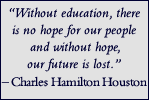Harvard Ends Early Admission: Beginning next year, Harvard will no longer accept early applications. All students will be chosen from the same pool of candidates in the spring. If other colleges and universities follow suit, black students may benefit from a more even playing field in the admissions process.
Harvard has delayed the enactment of its new admissions program for one year so that other universities would have the opportunity to follow suit. Harvard also stated that it would monitor the program closely for the next two or three years in order to determine if the elimination of early decision negatively affected the quality of students admitted to the university. In announcing the decision, Harvard interim president Derek Bok stated that one of the major reasons the university took this step was to remove the advantage early decision admissions offer to the more affluent applicants who are not concerned about financial aid. “Students from more sophisticated backgrounds and affluent high schools often apply early to increase their chances of admission, while minority students and students from rural areas, other countries, and high schools with fewer resources miss out,” Bok said. “Students needing financial aid are disadvantaged by binding early decision programs that prevent them from comparing aid packages.” As Harvard Goes, So Goes the Nation? Prior to the 1936 presidential election, there was a common saying in American politics: “As Maine goes, so goes the nation.” At that time, the state of Maine conducted its popular vote for president in September when the weather was good and people would have an easier time getting to the polls. Whatever party won the Maine popular vote would use the result to its advantage as its nominee could claim he was a winner. Frequently, whoever won the Maine vote would go on to win the general election in a majority of other states in November. The notion that “As Harvard goes, so goes the nation” holds just as much weight in higher education circles as the old political adage about Maine. Harvard is the trendsetter among American institutions of higher education. If Harvard is willing to forgo the advantage of admitting as much as 50 percent of its entering class through early admissions, other highly selective universities will undoubtedly follow suit. The elimination or severe curtailment of early decision programs at the nation’s highest-ranked colleges and universities will almost certainly put blacks on a more level playing field with other applicants. It is commonly believed that a student applying to one of the nation’s highest-ranked colleges and universities stands a better chance of gaining admission if he or she applies early rather than wait for the regular admissions season. The reasoning is that colleges are more likely to accept an early admission candidate because they are sure that the student is committed to attending the particular institution. By accepting a large number of early admission candidates, colleges and universities improve their overall student yield which improves their standing in many college ranking formulas. This perception that it is easier to be admitted to top colleges and universities if the applicant applies early is supported by early admissions statistics. For example, at Princeton University nearly one third of all students who applied early were accepted for admission. Princeton accepts only about 10 percent of all its applicants. Past JBHE surveys have shown that the early admission advantage also accrues to black applicants. For example, in 2003 Johns Hopkins accepted 77.8 percent of all black early applicants compared to 36.8 percent of all black applicants. Hamilton College accepted 72.7 percent of all black early applicants but only 45.7 percent of black applicants generally. Thus the abandonment of early admissions may have some negative impact on the numbers of blacks admitted to highly selective colleges. Why Few Blacks Apply Early If there is an advantage for black students to apply early, why is it then that black students are far less likely to apply for early admission than white students? There are several reasons why this is so. The first reason has to do with uncertainty about financial aid. College-bound students who apply for early admission, and in doing so commit to a particular institution in December, do not know at that time how much financial aid they can expect either from the federal government or from the university they wish to attend. This puts financially needy students, a group that is disproportionately black, in a financial bind if they choose to go the early admission route. The second reason has to do with the strong demand for highly qualified black students. As a consequence of the intense competition among the highest-ranked schools for academically strong black students, these well-prepared black applicants have discovered that they may win a better financial aid package if they wait for the regular admissions sweepstakes and take advantage of the competitive process that allows several universities to make them financial aid offers. This opportunity to “play the field” in negotiating financial aid is also used by black athletes, musicians, and others with particular talents who are in high demand by colleges and universities. But this bargaining must be done during the regular admissions process and not during the early admissions season. It should be kept in mind that a large number of early decision applicants are so-called legacy students whose parents or grandparents attended the particular institution. Almost no black students have a family legacy tradition at the top-rated universities because, at the time their parents and grandparents were of college age, these universities remained almost totally closed to blacks. In addition, largely because their parents, family members, and friends are more likely to have gone through the college application process, college-bound white students are more apt than college-bound black students to know the ropes of the college application “game.” White students are more likely to be exposed to, and to seek out sound advice on, the merits of applying early. In conclusion, it is expected that Harvard’s decision to end early admissions will have a domino effect among the nation’s highest-ranked colleges and universities. Having all students compete in one admissions cycle when black students can “play the field” and negotiate their financial aid package with several competing institutions will be a positive development in African-American higher education. At the same time, there may be a competing disadvantage in that, according to JBHE data, blacks who do apply early have done very well in securing places at our leading universities. Therefore, they may be harmed when early admissions goes away. |
|




 I
I Currently, students who apply early admission to Harvard by November 1 are notified of the college’s decision by December 15. But unlike most early decision programs, Harvard’s early action program is not binding. Harvard’s program does not require students accepted under early admission to commit to enroll.
Currently, students who apply early admission to Harvard by November 1 are notified of the college’s decision by December 15. But unlike most early decision programs, Harvard’s early action program is not binding. Harvard’s program does not require students accepted under early admission to commit to enroll.